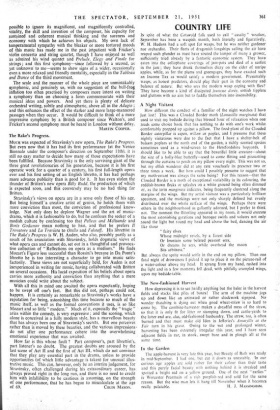The Rake's Progress.
Muca was expected of Stravinsky's new opera, The Rake's Progress. But even now that it has had its first performance (at the Venice Biennale under the composer's direction on September 1 1 th), it is still no easy matter to decide how many of those expectations have been fulfilled. Because Stravinsky is the only surviving giant of the three great revolutionaries of his generation, because it is his first operatic work for a quarter of a century, his first full-length opera ever and his first setting of an English libretto, it has had perhaps more advance publicity than is good for it. It has even stolen the thunder of Britten's new opera Billy Budd, the production of which is expected soon, and this conversely may be no bad thing for Britten.
Stravinsky's views on opera are in a sense only those of his age. But being himself -a creative artist of genius, he holds them with more conviction than most, the conviction of professional know- ledge. Not only does he deplore Wagner and the art of music- drama, which it is fashionable to do, but he confuses the seeker of a modish culture by confessing too that Pelleas and Melisande and Boris Godunov mean nothing to him, and that he prefers Il Trovatore and La Traviata to Otello and Falstaff. His librettist in The Rake's Progress is W. H. Auden, who also, possibly partly as a result of his association with Stravinsky, holds dogmatic views of what opera can and cannot do, set out in a thoughtful and provoca- tive collection of " Reflections on opera as a medium." He finds Mozart's Figaro less successful than Rossini's because in Da Ponte's libretto he is too interesting a character to go into music satis- factorily. These views are not superficially held, for Auden is not inexperienced in writing for music, having collaborated with Britten on several occasions. His lucid exposition of his beliefs about opera carries more authority and conviction than anything that a mere musician could write about the subject.
With all this in mind one awaited the opera expectantly, hoping to be swept off one's feet. But this did not, perhaps could not, happen. It is certainly as remarkable as Stravinsky's works have a reputation for being, astonishing this time because so much of the music itself, as well as the formal conventions it uses, is so like Mozart and so little " modern." Much of it, especially the " tragic " arias within the comedy, is very expressive ; and the scoring, which alone is conceived in a fully modern style, has a marvellous beauty that has always been one of Stravinsky's secrets. But one perceives rather than is =moved by these beauties, and the various impressions do not after one performance cohere into the overwhelming emotional experience that was awaited.
How far is this whose fault ? Part composer's, part librettist's, part listener's no doubt The greatest doubts are aroused by the last scene of Act II and the first of Act III, which do not convince that they play any essential part in the drama, unless to provide opportunities (of which little advantage is taken) for unusual illus- trative music. This can, however, only be an interim judgement, for Stravinsky, often challenged during his extraordinary career, has always proved right in the long run, and there is no need to credit him with infallibility to be cautious in assumiag, on the strength of one performance, that he has begun to miscalculate at the age


































 Previous page
Previous page